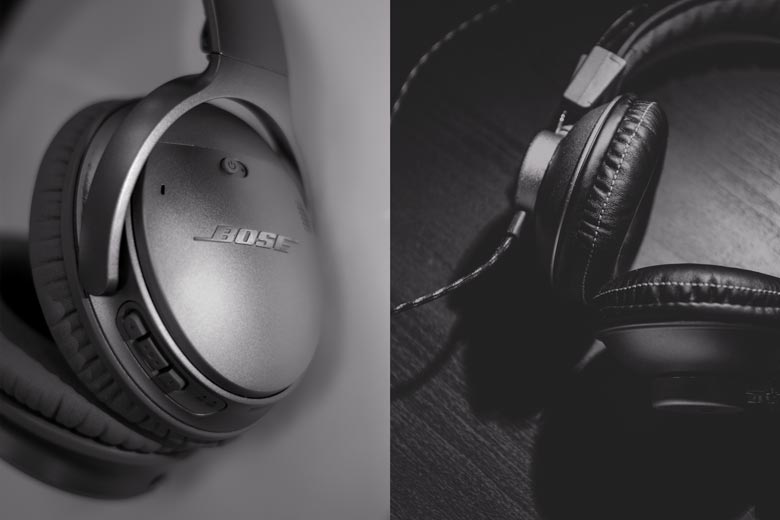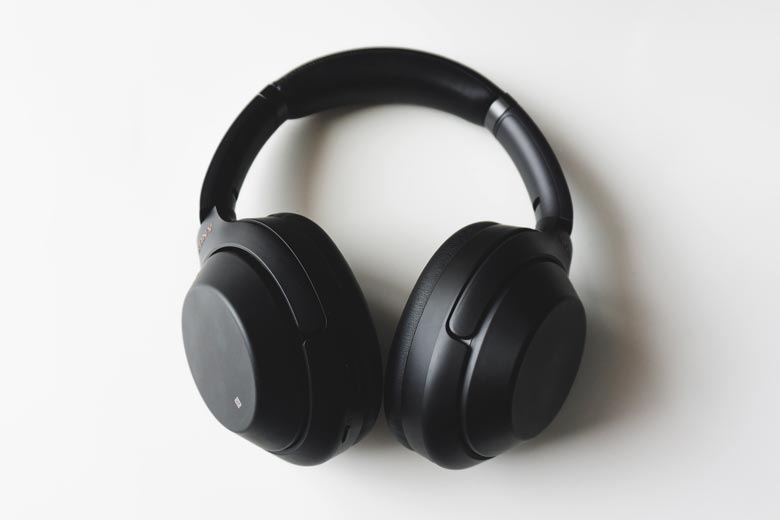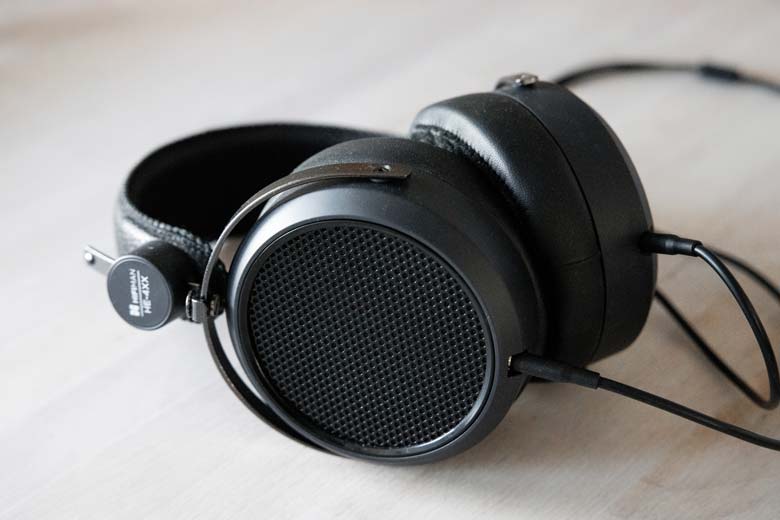Bluetooth has become one of the most popular headphone formats, especially with the introduction of Apple AirPods and Beats headphones. Although Bluetooth seems to be taking over the headphone industry by storm due to its wireless design, the sound quality is hardly better than wired headphones.
When it comes to Bluetooth vs. wired headphones, wired headphones consistently have better sound quality than Bluetooth headphones. The differences in sound are minor enough that some people may not notice the difference, but people with sharp hearing can tell the difference.
So, let’s get into the details. We’ll talk about the development of wired and Bluetooth headphones, and we’ll dive deeper into the differences between their sound quality. You’ll also learn more about why wired headphones or Bluetooth headphones might be the right choice for you.

The Origin of Wired Headphones
The first wired headphones date back to the early 1900s, primarily used by telephone operators, pilots, and military personnel. Eventually, people connected headphones to their home radios, but these early headphones had terrible sound quality compared to today’s wired headphones.
In 1979, when Sony released the Walkman, they also released the first low-profile, streamlined headphones. By the early 1980s, companies such as Phillips, Sony, and Bose were designing noise-canceling headphones and earbuds with varying sound quality.
Usually, these headphones compressed the sound so heavily that the quality suffered. But in the 1990s, the development of the iPod led to higher-quality headphones!
Nowadays, wired headphones can deliver an excellent listening experience, and quite a bit of research indicates that wired headphones are still better than Bluetooth when it comes to sound quality.
Wired headphones can process a more comprehensive range of frequencies, and they can play audio at louder volumes without creating fuzzy background noise. Wired headphones are also very reliable since they are not battery-powered, and they do not cut out sounds as often as Bluetooth devices.
The Development of Bluetooth Headphones
In 1999, IBM and Ericsson released the first Bluetooth headset to consumers. This new technology didn’t take off right away though, especially since the sound quality was worse than that of an mp3 file.
However, as Bluetooth has advanced, the sound quality has significantly improved. By 2009, Qualcomm® aptX™, a new Bluetooth codec, was for the first time used in a headset that took wireless headphones to a whole new level.
Qualcomm® aptX™ used a different kind of sound compression to achieve 325 kbps @ 44.1kHz sampling frequency, which was an important step for getting consistent, high-quality audio to wireless consumer electronics.
Today there are quite a few Bluetooth codecs available, from multiple companies, and they only get better and better.
Bluetooth has come a long way in the past ten years, and engineers are still developing Bluetooth technology. Bluetooth is far from perfect at this point, especially when it comes to playing a full range of sound frequencies in audio samples.
Still, it has developed rapidly, and it is becoming one of the most popular headphone formats.
Sound Quality of Bluetooth Headphones Explained
Naturally, all Bluetooth headphones have different compression rates. But regardless of the headphone brand, Bluetooth consistently has some drawbacks when it comes to sound quality.

Bluetooth headphones convert sound files into a digital signal that the headphones read and decode to turn the data into sound.
During this transmission process, several problems can occur, resulting in a noisy, incomplete audio experience.
How Does Bluetooth Transmit Audio?
Bluetooth headphones use three different radio waves to transmit sound from your device to your headphones. These three technologies are Bluetooth, radiofrequency, and infrared frequency.
Some wireless headphones use more than one of these transmitting technologies to expand the range of frequencies and files that the headphones can play.
Radiofrequency
Radiofrequency headphones are far more efficient and accurate than Bluetooth transmitting headphones since they use a stereo frequency modulation system that does not require as much audio compression as Bluetooth.
Your device sends out electromagnetic waves that your headphones can read with the radiofrequency transmission, much like radios send out signals from one central location.
Infrared
The infrared transmission uses an infrared signal to connect the device and your headphones.
Using infrared technology, the device and your headphones must be close together, and if anything stands in between the device and the headphones, the signal breaks.
Bluetooth
The codecs of a Bluetooth device, which are the receivers that receive the signal from your device and interpret them into sound, frequently miss signals, causing extra noise to play on your headphones.
Sometimes, when you listen to music or sound files with very high notes or deep bass sounds, the headphones cannot process these notes, and they skip segments of the audio.
Drawbacks of Bluetooth Headphones’ Sound Quality
Because Bluetooth headphones can only interpret one set range of notes, and since they are prone to skipping sections of audio, they have some problems that wired headphones do not.
Possible Volume Issues (Interference)
Bluetooth headphones usually have worse sound quality at high volumes. If you are playing your music at a volume higher than 90 decibels, your Bluetooth headphones may generate extra white noise or cut out the higher volumes.
This interference occurs because the codecs cannot interpret higher volume sounds the way that wired headphones can.
Bluetooth & Other Devices
Bluetooth also performs differently with different devices. According to a study done by SoundGuys, Apple performs well with Bluetooth, which makes sense since they have completely switched over to marketing Bluetooth AirPods and wireless headphones.
Overall, many Android phones do not seem to perform well with Bluetooth devices, and the sound often drops out on higher or lower notes.
On the tested Android devices, the Bluetooth sound also picks up a lot of background noise and static, so you might want to use wired headphones while listening on an Android device.
24-Bit Audio Concerns
Generally, Bluetooth cannot play the entire sound profile for 24-bit audio, even though some codecs do support it. 24-bit audio is different from mp3 in that it includes the whole sound profile for an audio sample.
Mp3 files remove sounds that cannot be heard by the human ear from an audio file, making it smaller and more manageable for a Bluetooth device to read.
Since 24-bit audio includes very high and very low notes that the average human ear cannot hear, these audio files are harder for Bluetooth codecs to read.
Trouble Reading Other File Types
Bluetooth has more trouble reading FLAC, WAV, or ALAC files, as well. Because of these files’ high compression, it is difficult for Bluetooth’s codecs to decode the file fully while you are listening.
Most people use other, less compressed file formats like mp3, though, so unless you often use compressed files for your casual listening, you should not have any problem with Bluetooth audio.
Bluetooth headphone developers are still trying to design better Bluetooth headphones, so you should not throw in the towel just yet. The main problem with Bluetooth headphones is the codec design.
Some headphone developers are trying to design better codecs for Bluetooth headphones, eliminating all of the drawbacks of Bluetooth headphones’ sound quality.
A Look at the Best Bluetooth Headphones
Generally, the best performing Bluetooth headphones are the ones with Qualcomm’s aptX HD or Sony’s LDAC codec. These headphones have excellent Bluetooth codecs that do a great job making it possible to listen to high-quality audio totally wireless.
It makes them compatible with highly compressed and 24-bit audio files, even though they still might have some problems regarding volume and range.
Still, these headphones do not perform quite as well as wired headphones do since they do not pick up on all of the sound waves in any given audio file, and they start to create extra background noise at a volume of 90 decibels.
However, most people will not notice the differences between Bluetooth and wired headphones’ audio, especially if they are older than 24 or have damaged hearing.
If you compare high-quality headphones, only the sharpest of ears can hear the difference in sound quality.
They also usually only drop out notes on the highest and lowest human hearing ranges, so Bluetooth’s inferior sound quality is not so noticeable to make them a lousy headphone option.
But I would stay away from the cheapest wireless Bluetooth headphones. To get good quality you usually have to pay a little bit extra, but it’s totally worth it.
Benefits of Bluetooth Headphones’ Sound Quality
Overall, the sound quality of Bluetooth headphones is not so bad, but it is not as good as that of wired headphones since Bluetooth does not play the entire frequency range of an audio file.
Bluetooth headphones play mp3 files with no problems as long as you listen at a reasonable volume. But the sound is usually best if you are playing your audio below 78 decibels.
Bluetooth headphones also play audio at a range, allowing you to move around while listening without disrupting the sound quality. The wide spatial range is the primary benefit of using Bluetooth headphones.
If you move too much while you have wired headphones on, you can bend and short the headphones’ wires, disrupting the sound and potentially breaking them.
Sound Quality of Wired Headphones Explained
When it comes to sound quality, wired headphones win almost every time. Of course, not all wired headphones are as good as some Bluetooth headphones, and vice versa, but generally, wired headphones do not encounter the same problems that Bluetooth headphones do.

How Do Wired Headphones Transmit Sound?
Wired headphones use analog audio to play sound. Wired headphones do not require any decoding or encoding to transmit the sound. They play the audio file without modifying it in any way, which is very different from how Bluetooth headphones play back audio.
Because wired headphones do not digitize the audio file before playing it, they can play sounds that Bluetooth headphones cannot.
Benefits of Wired Headphones’ Sound Quality
Wired headphones can successfully play many files that Bluetooth headphones cannot. Wired headphones can play 24-bit audio with no problem. Because they do not need to convert the audio file into a digital signal, they do not have to modify the audio file to play it.
Wired headphones can pick up on all of the inaudible sounds in an audio file with their analog format, making the sound much richer and complete.
Playing Compressed Files
Wired headphones can also play heavily compressed files like FLAC, WAV, and ALAC files, making them much more versatile than Bluetooth headphones.
Since wired headphones can play almost any audio file and do not need to recode the audio file to play it, they are handy for all kinds of projects, from audio editing to sound recording.
Higher Volumes Are Once Again an Option
Wired headphones can also play music at very high volumes without corrupting an audio sample’s sound quality.
While Bluetooth headphones start to create fuzzy background noise in a file at 90 decibels of volume, wired headphones can usually play up to 110 decibels of sound without introducing any background noise.
More Compatibility
Wired headphones are compatible with any device that has a headphone jack. You can easily listen to an old record player with wired headphones, and they are compatible with any phone that you can plug them into.
Since wired headphones’ sound quality is not affected by the audio file device, they are versatile and useful for many different purposes.
Drawbacks of Wired Headphones’ Sound Quality
The only actual downside to wired headphones’ sound quality is that the headphones’ wires can break or short, causing one or more of the earpieces to stop playing sound.
It can be frustrating to have a pair of headphones with a shorted wire, and with Bluetooth, you do not have to worry about broken or disconnected wires.
Sound Quality of Wired and Bluetooth Headphones Compared
So, the sound quality of Bluetooth headphones is almost always worse than that of wired headphones. In summary:
| Wired Headphones | Bluetooth | |
|---|---|---|
| 24-bit Audio | Can play 24-bit audio | Cannot play 24-bit audio |
| Compatible Files | Can play FLAC, WAV, and ALAC files | Cannot play FLAC, WAV, and ALAC files |
| Maximum Volume | Volume maximum 85 to 110 decibels | Volume maximum 90 decibels |
| Compatible Devices | Works consistently with any device | Has trouble reading files from Androids |
Wired vs. Bluetooth: Which One Is Right for You?
Bluetooth Headphones
Wireless headphones, despite their sound quality drawbacks, are still helpful and excellent devices in certain circumstances.
- Good for active people: Although they have inferior sound quality, Bluetooth headphones are excellent for listening in loud places, traveling, or working out since you can move around without a wire tying you down.
- Convenient: Bluetooth headphones are well-known for being fabulous work-out headphones since a long cord does not limit your movement. You can also leave your phone in a bag while using wireless headphones, which can be very convenient if you are on the move.
- Often have extra benefits: Wireless headphones sometimes also have additional benefits, like an FM radio, SD card input, aux cord input for wired listening, microphones, and manual controls. Since Bluetooth headphones often have many amenities that wired headphones do not have, they can be helpful and versatile when traveling or if you want to have all of your listening devices in one place.
Wired Headphones
Wired headphones have some extra benefits that may make them the right headphone choice for you.
- Superior sound quality: Wired headphones, with their superior sound quality, are fabulous for audiophiles and recording artists. There is a reason that most recording artists use wired headphones in the studio. Wired headphones offer superior, fuller sound quality, and they can play all file formats with ease.
- Reliable: Wired headphones are also more reliable for recording audio and having phone conversations since the sound will not break out. If you are often on long phone calls, Bluetooth headphones may break out sounds, or the battery could die in the middle of a conversation. For phone calls and recording, wired headphones are supreme since they are reliable and will not run out of battery on you.
- Don’t run out of charge: Wired headphones also do not run out of charge, which is more convenient for long listening sessions and gaming. If you often use headphones while you play video games, the long sessions could wear out the battery of your headphones. To be safe, you might want to use wired headphones so that you do not lose connection in the middle of a game.
- Cheaper than Bluetooth headphones: Wired headphones are usually cheaper than Bluetooth headphones, which can easily be a dealbreaker when shopping for a new headphone set. With all of the sound benefits, the lower price of wired headphones makes them the total package.
- Easy to use: Wired headphones are no-nonsense. You will not have to deal with your sounds cutting out when using wired headphones, and you do not have to charge them. Since they are a lot easier to use than Bluetooth headphones, they are a great choice if you do not want to mess with charging your headphones and connecting them to your devices.
- Can be used with many devices: Not all devices are Bluetooth compatible, but most audio-producing devices have a headphone jack or aux cord output. Since you can use wired headphones with electronic instruments, record players, TVs, phones, mp3 players, computers, and more, they are handy to have around.
Summary
Wired headphones have the superior sound quality to Bluetooth, but the differences between the two are not so radical that Bluetooth is not a good option.
With its digital receiving format, Bluetooth can sometimes alter audio files, removing the lowest and highest sounds from the audio wavelengths.
Bluetooth headphones also have trouble playing some audio files, and they can skip sounds that they cannot decode.
